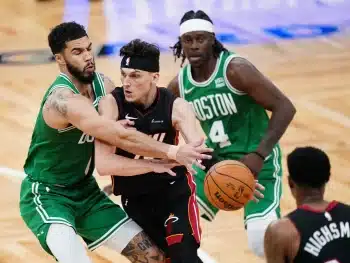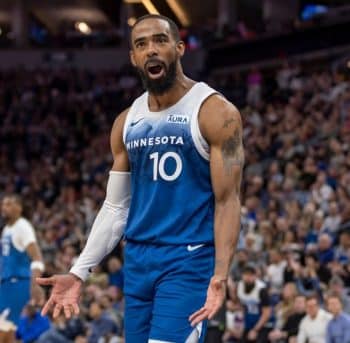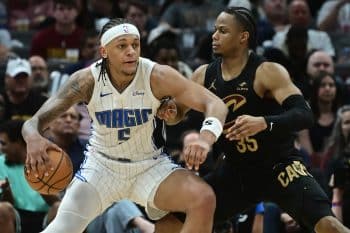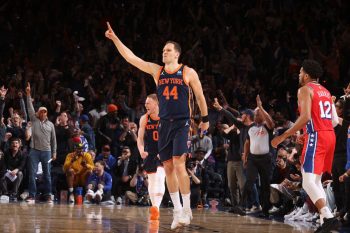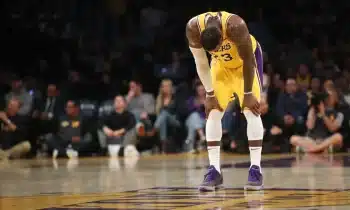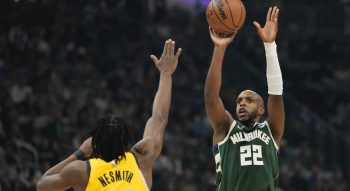NBA
Is Trading for Kyrie Irving Worth the Risk?
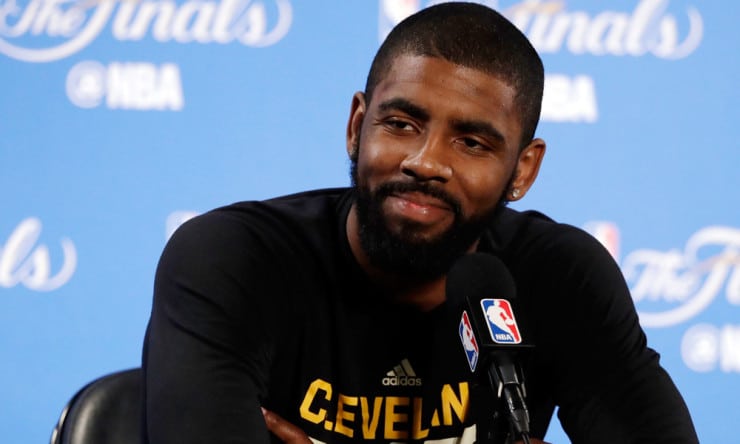
When reports first surfaced that Kyrie Irving had requested a trade and that New York was one of his “preferred destinations,” Knicks fans were thrilled. And the excitement was understandable.
New York has been in desperate need of a quality point guard for a long time and Irving, one of the most gifted and dynamic young guards in the NBA, would represent an enormous upgrade for the Knicks. There is simply no denying that the Knickerbockers would be a far more competitive team with Kyrie running the show. He’d be welcomed with open arms, greeted as a superstar and would immediately have Madison Square Garden buzzing again. The offensive fireworks produced by a tag-team of Irving and Kristaps Porzingis would make the Knicks exciting and entertaining for the first time in a long time.
Yet, with all that said, giving away the farm to bring Irving to NYC would be a mistake. Trading away too many valuable assets would set the Knicks franchise back in the long term.
Here’s why…
The Knicks currently own all their future first-round draft picks, which is an uncommon situation for this franchise. They also have a solid foundation in place, centered around Kristaps Porzingis, Frank Ntilikina and Willy Hernangomez. That core will be supplemented by what is expected to be another high lottery pick next June.
They will also have a decent amount of cap space to play with next summer, assuming Carmelo Anthony is no longer on the roster. (They would have far more space and far greater flexibility if they hadn’t overpaid for Tim Hardaway Jr., but that’s a story for another day.)
As I have previously written about in this space, the Knicks should be steadfastly focused on the long-term future. They should aim their attention at how to best maximize Porzingis in his prime, which is still a few years down the road. Attempts to immediately improve the team’s record this season or next, at the expense of the future, would be a fool’s errand, especially considering New York has no chance of competing with the league’s best teams. There’s an old maxim that declares “good is the enemy of great.” Well, in recent Knicks history, the enemy of “sustainable success” has been: “Let’s doing something short sighted and flashy so that we won’t suck next season.”
Too often in years past, instead of taking their much-needed medicine and investing in a methodical, patient rebuild, the Knicks have abandoned well-laid plans to chase immediate satisfaction, which inevitably fails to produce the desired results. The Knicks have a chance to rebuild the right way. Porzingis and company are the cornerstones.
Let’s take a second here to address the concerns of those worried about Porzingis skipping town as a free agent. In actuality, it’s a highly unlikely scenario. Next summer, Porzingis will be eligible to sign a massive five-year extension with the Knicks. Based on current salary cap projections, that extension will be worth $156.6 million, an average of $31.3 million per season. It would kick in following the 2019-20 season. If KP were to decline that offer, the Knicks would still control his rights through 2019-20. Yes, he would have to wait until July 1st of 2020 to become an unrestricted free agent. Again, despite the recent bumps in the relationship between Porzingis and the franchise that drafted him, it is very difficult to envision a scenario where Porzingis (after conferring with his agent and family) refuses to sign an extension that would provide him with immense financial security and generational wealth. Assuming he signs the offered extension next summer, the Knicks would have him locked up through the end of the 2024-25 season.
Okay, so if we agree that KP is going to remain in NYC for the foreseeable future, then the impetus is on the Knicks’ front office to properly build around him so that New York slowly evolves, and then peaks, years down the road.
Many Knicks fans will declare: “Trading for a 25-year old Kyrie Irving, an offensive superstar about to enter his prime, is a no-brainer! Pair him alongside Porzingis and get a front-row seat for the Knicks resurgence. You can’t win without a dominant point guard, and the Knicks need to do whatever is necessary to bring Kyrie to MSG!”
Parts of that argument are accurate. However, the primary flaw with that line of thinking is there is absolutely no guarantee that Kyrie will be around for more than two seasons. Unlike Porzingis, Irving would be disincentivized to sign an extension with the Knicks. In order to secure max money, Kyrie has to opt out of his current contract in the summer of 2019 and become an unrestricted free agent. And this is a guy who has requested a trade from a team that won a title and advanced to three straight NBA Finals; how confident can the Knicks be that he’ll be 100 percent committed to staying in New York two years from now?
Furthermore, assuming the Knicks have to give up a package of picks and Carmelo Anthony (and possibly a player such as Courtney Lee or Kyle O’Quinn), what’s the best case scenario for that newly-formed Knickerbocker team. Do they flirt with .500? Maybe they even scratch out 45 wins? Could they win a few playoff games? It’s conceivable they even advance to the second round of the postseason.
They would have an undeniably explosive and exciting offense, but a starting backcourt of Irving and Hardaway Jr. would be abominable defensively. Hernangomez is also a subpar defender at the center position. If Melo is gone, who starts for the Knicks at small forward? Also, the analytics suggest Irving is not capable of carrying a team if he is the focal point.
In 2018-19, Irving, Hardaway and Joakim Noah would account for approximately $58 million, or nearly 60 percent of the team’s salary cap. It would be difficult to adequately flesh out the roster in just one year dealing with those cap constrictions.
If the Knicks’ record does not improve dramatically over the next two seasons, what are the odds Irving agrees to re-sign and stay in New York?
That brings us to the potential nightmare scenario of Irving abandoning the Knicks in two years and leaving behind a roster bereft of talent, and the draft picks necessary to improve.
Some meaningful games in May and a couple of seasons worth of amazing crossovers and highlight plays that energized MSG would be welcomed. But at what cost?
If the Cavs were desperate to dump Irving and were willing to send him to the Knicks at a discount, then New York would be foolish to pass up such an opportunity. For instance, if the Knicks only had to trade away Carmelo Anthony and a first-round pick with limited protections, then that’s a deal they should pull the trigger on. However, the Cavs are currently demanding far more. (Not to mention the fact that Melo would have to waive his no-trade clause to consummate such a transaction.)
Despite Irving’s trade request and his accompanying list of preferred landing spots, the Cavaliers have absolutely no reason to do him any favors. Unlike Melo, he does not have a no-trade clause. The Cavs can send him to whichever team offers the most enticing return. Irving’s preference is irrelevant from their perspective.
Cleveland reportedly wants a veteran starter, a young player on a rookie contract and draft picks. Adrian Wojnarowski of ESPN reported that the HEAT offered a package centered around Goran Dragic and Justise Winslow, but that still wasn’t enough.
As of now, the Cavs would likely ask for Carmelo Anthony, Frank Ntilikina and future draft picks. That’s simply too high of a price tag, too much of a gamble.
It is important to note that the Knicks have gone “all in” on young, exciting, offensively-gifted players in the past. The results have not been favorable.
* In June of 2002, the Knicks traded Marcus Camby, Mark Jackson and the No. 7 overall pick (Nene) to Denver in exchange for Antonio McDyess, who ended up playing a grand total of 18 games as a Knick, averaging 8.6 points and 6.6 rebounds.
* In January of 2004, the Knicks traded away a plethora of players and took on a bad contract (Anfernee Hardaway) and traded away future first-round draft picks (one of which turned into Gordon Hayward) to acquire Stephon Marbury from Phoenix. The Knicks failed to win a single playoff game during Marbury’s time in New York.
* In October of 2005, the Knicks traded away two future first-round picks in exchange for Eddy Curry. LaMarcus Aldridge and Joakim Noah were later selected with the two picks the Knicks gave up.
* In February of 2011, the Knicks traded away Wilson Chandler, Raymond Felton, Danilo Gallinari, Timofey Mozgov, cash and multiple future picks (one of which turned into Dario Saric) in exchange for Carmelo Anthony.
You get the idea…
If the Knicks are involved an eventual blockbuster involving Kyrie and Melo, it would be wise for New York to pursue a deal in which they were the team that doesn’t land the star player, but rather facilitates the transaction and ends up with draft picks instead. We know all too well about the many first-rounders the Knicks have traded away (I didn’t even mention the infamous Andrea Bargnani deal above), but New York has not received a first-round pick in a trade since the Spurs sent them two protected picks to take on Malik Rose’s salary in 2005. The Knicks have not owned the rights to both their first and second-round picks in the same draft since 2003.
Furthermore, if it is true that Kyrie “very badly wants to join the Knicks” as has been intimated, then the Knicks should play the long game and wait him out. He’ll be a free agent soon enough.
If New York holds onto Ntilikina and their future draft picks (and whatever other assets they might get back in a separate Melo deal), they would be a far more attractive option once Irving hits the free agent market in July of 2019. Porzingis will be two years closer to his prime. It’s possible the Knicks could be viewed as a team on the precipice of being competitive, needing a stud point guard to push them into the playoffs and beyond. Irving would be needed far more at that point than he is right now. And, most importantly, the Knicks wouldn’t have to give up any draft picks or players to bring him home.
Of course, there is the risk that Irving has no interest in playing for New York at that point, but the Knicks would still be in a position to attract other free agents or use that available cap space to improve the roster in other ways.
Assuming the asking price for Kyrie Irving remains too steep, it’s time for the Knicks to stop giving into the temptations that have tripped them up in the past and chart a new course, one centered on Porzingis, patience and picks.
